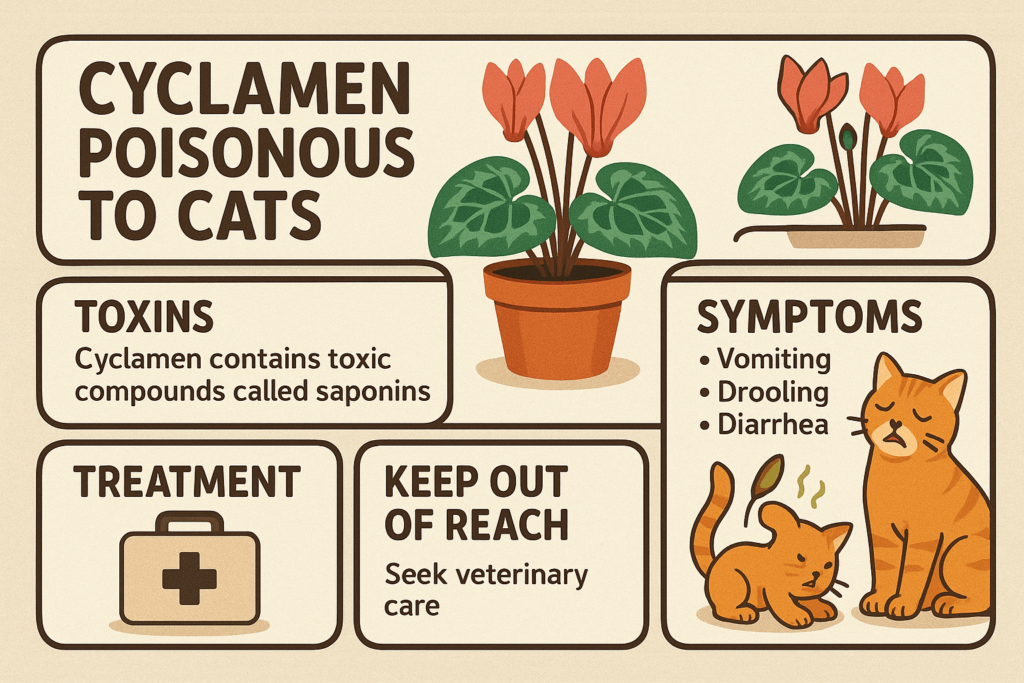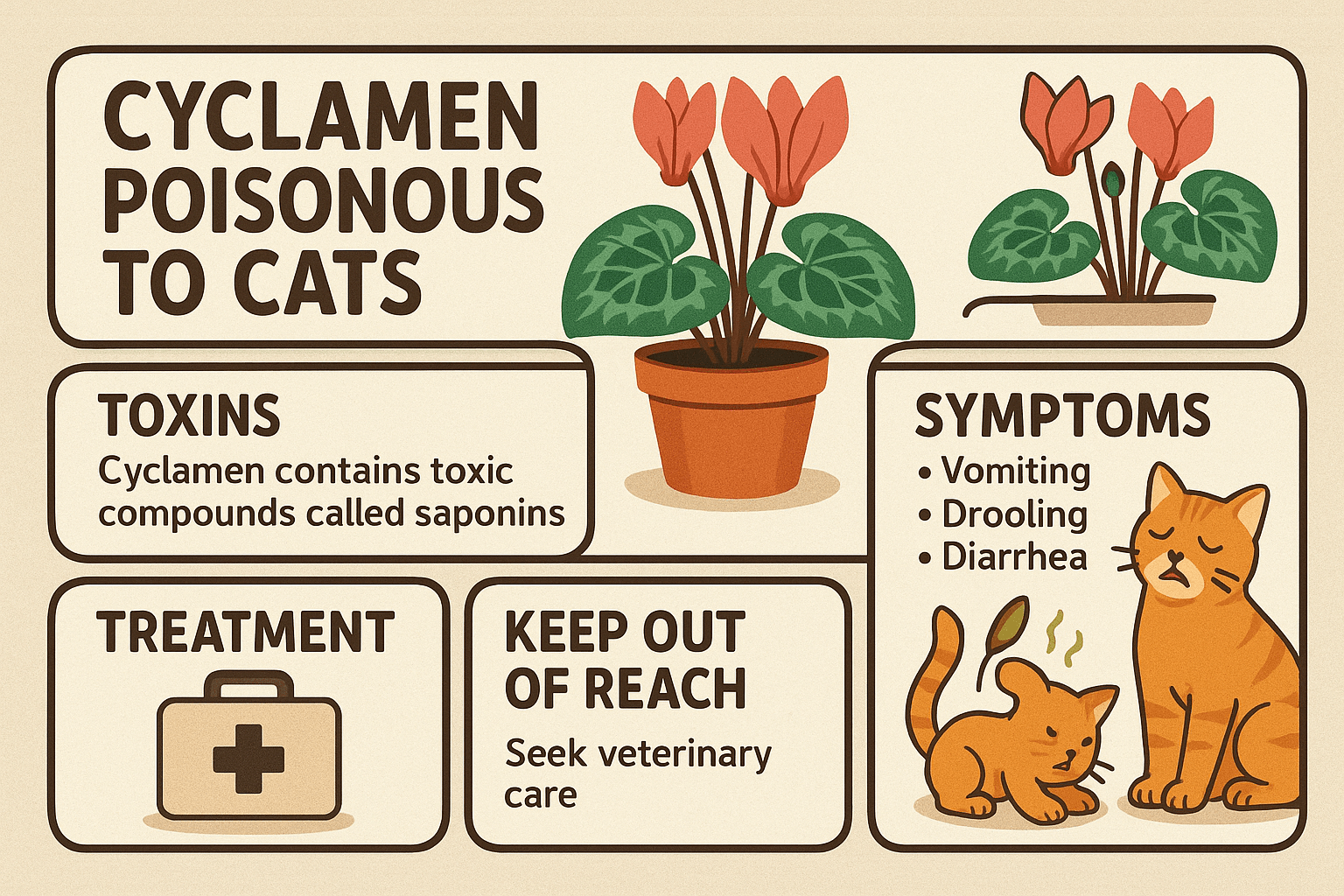Is Cyclamen Poisonous to Cats?
Cyclamen, with its vibrant blooms and lush foliage, is a popular houseplant that adds beauty and charm to any home. However, for cat owners, this plant poses a potential risk. Cyclamen contains toxic compounds that can be harmful if ingested by curious felines. Understanding the dangers, recognizing symptoms of poisoning, and taking preventive measures are essential steps in ensuring your pet’s safety. In this article, we’ll explore everything you need to know about cyclamen toxicity, from identifying risks to managing emergencies, so you can keep both your plants and your furry friends safe.
Why Cyclamen Is Dangerous for Cats
While cyclamen may look innocent and decorative, its toxic properties make it a serious hazard for cats. Here’s what makes this plant dangerous and why vigilance is crucial.
Toxic Compounds in Cyclamen:
Cyclamen contains saponins, particularly in the roots, which are toxic when ingested. These compounds can irritate the gastrointestinal tract and cause systemic effects.Severity of Toxicity:
The level of toxicity depends on the amount consumed. Even small amounts can lead to mild symptoms, while larger ingestions may result in severe reactions.Common Risk Areas:
Indoor potted cyclamen plants or outdoor garden varieties are equally hazardous, especially if they’re within reach of your cat.Curiosity Drives Ingestion:
Cats are naturally curious and may chew on leaves, stems, or roots out of boredom or exploration, increasing the risk of poisoning.No Known Antidote:
There is no specific antidote for cyclamen poisoning, making prevention and early intervention critical for your cat’s well-being.
By understanding these factors, you can take proactive steps to minimize the risks cyclamen poses to your feline companions.

Signs and Symptoms of Cyclamen Poisoning in Cats
If your cat has ingested cyclamen, it’s important to recognize the signs early. Symptoms can vary depending on the amount consumed but typically include the following indicators.
Vomiting and Diarrhea:
These are common initial symptoms caused by irritation of the digestive system.Excessive Drooling:
Drooling may occur as a reaction to oral irritation or nausea triggered by the toxins.Loss of Appetite:
Cats may refuse food due to discomfort or illness caused by the ingestion.Lethargy and Weakness:
Systemic effects of the toxins can leave your cat feeling unusually tired or unresponsive.Abnormal Heart Rate:
In severe cases, cyclamen poisoning can affect the cardiovascular system, leading to irregular heartbeats.
Prompt veterinary attention is crucial if you notice any of these symptoms, as early treatment can prevent complications.
Check this guide 👉Is Gladiolus Cat Safe? Best 7 Expert Tips!
Check this guide 👉Is the Corn Plant Cat Safe? Best 7 Health Tips!
Check this guide 👉Are Carnations Cat Safe? Best 7 Expert Tips!
Preventive Measures for Cyclamen Safety | Steps to Take If Your Cat Ingests Cyclamen |
|---|---|
Keep cyclamen plants out of reach | Contact your veterinarian immediately |
Use hanging planters for indoor cyclamen | Monitor your cat for symptoms of poisoning |
Avoid planting cyclamen in accessible areas | Do not induce vomiting without professional advice |
Educate family members about cyclamen risks | Provide details about the plant and exposure |
Opt for cat-safe plants instead | Follow all treatment instructions carefully |
How to Prevent Cyclamen Poisoning in Cats
Prevention is always better than cure when it comes to protecting your cat from toxic plants like cyclamen. Here are some strategies to keep your home safe and your pet healthy.
Place Plants Out of Reach:
Position cyclamen plants on high shelves, countertops, or in hanging baskets where your cat cannot access them.Create Physical Barriers:
Use baby gates or enclosures to block access to rooms where cyclamen is kept.Supervise Playtime Near Plants:
Always keep an eye on your cat during play sessions near potentially hazardous plants.Choose Pet-Friendly Alternatives:
Replace cyclamen with non-toxic plants like spider plants, Boston ferns, or African violets, which are safe for cats.Educate Family Members:
Ensure everyone in your household understands the risks of cyclamen and knows how to keep your cat safe.
Taking these precautions can significantly reduce the likelihood of accidental ingestion and keep your cat out of harm’s way.
What to Do If Your Cat Eats Cyclamen
If you suspect your cat has ingested cyclamen, immediate action is essential. Follow these steps to ensure your pet receives the care they need.
Stay Calm and Assess the Situation:
Determine how much of the plant was eaten and whether your cat is showing any symptoms.Contact Your Veterinarian Right Away:
Call your vet or an animal poison control hotline for guidance on next steps.Do Not Induce Vomiting Without Advice:
Attempting to make your cat vomit at home can worsen their condition without proper guidance.Provide Detailed Information:
Share details about the plant, the amount ingested, and any symptoms observed to help the vet make an accurate diagnosis.Follow Veterinary Instructions Carefully:
Administer any prescribed treatments and monitor your cat closely during recovery.
Acting quickly and responsibly can make all the difference in ensuring your cat recovers fully from cyclamen poisoning.
Common Misconceptions About Cyclamen and Cats
Misinformation about cyclamen and its effects on cats can lead to dangerous oversights. Clearing up these misconceptions helps cat owners make informed decisions.
Myth: Only Outdoor Cyclamen Is Dangerous:
Both indoor and outdoor cyclamen pose risks, regardless of where they’re located.Myth: Small Amounts Are Harmless:
Even small ingestions can cause mild symptoms, making no amount truly “safe.”Myth: Cats Won’t Eat Plants They Don’t Like:
Cats are curious and may nibble on plants out of boredom, not necessarily because they find them appealing.Myth: All Parts of the Plant Are Equally Toxic:
While all parts are toxic, the roots contain higher concentrations of harmful compounds.Myth: You Can Treat Cyclamen Poisoning at Home:
Professional veterinary care is necessary for proper diagnosis and treatment.
Understanding the truth behind these myths ensures you take the right precautions to protect your cat.
Safe Alternatives to Cyclamen for Cat Owners
If you love decorating with plants but want to prioritize your cat’s safety, consider these pet-friendly alternatives to cyclamen.
Spider Plants:
Spider plants are easy to care for and completely non-toxic to cats.Boston Ferns:
These lush, green plants add elegance to your space without posing a threat to your pet.African Violets:
With their colorful blooms, African violets are a safe and attractive option for cat owners.Parlor Palms:
Parlor palms are low-maintenance and safe for cats, making them ideal for busy households.Herbs Like Basil or Mint:
Growing herbs not only decorates your home but also provides fresh ingredients for cooking—without risking your cat’s health.
Switching to these alternatives allows you to enjoy greenery without compromising your cat’s safety.
How to Create a Cat-Safe Plant Environment
Creating a home that accommodates both your love for plants and your cat’s curiosity requires thoughtful planning. These tips will help you design a cat-safe plant environment.
Use Elevated Spaces:
Place plants on shelves, mantels, or wall-mounted planters to keep them out of your cat’s reach.Secure Hanging Planters Properly:
Ensure hanging baskets are securely fastened to prevent them from falling and injuring your cat.Train Your Cat to Avoid Plants:
Use positive reinforcement techniques to discourage chewing or playing with plants.Regularly Inspect Plants for Accessibility:
Check frequently to ensure your cat hasn’t found new ways to access toxic plants.Remove Problematic Plants Entirely:
If certain plants repeatedly pose risks, consider removing them from your home altogether.
With these strategies, you can strike a balance between your passion for plants and your commitment to your cat’s safety.
Frequently Asked Questions About Cyclamen and Cats
Is every part of the cyclamen plant toxic to cats?
Yes, all parts of the cyclamen plant contain toxins, but the roots have the highest concentration of harmful compounds.
Can cyclamen poisoning be fatal for cats?
In severe cases, especially with large ingestions, cyclamen poisoning can be life-threatening. Immediate veterinary care is essential.
Are there safe plants I can keep around my cat?
Yes, many plants like spider plants, parsley, and marigolds are non-toxic and safe for cats.
How long does it take for symptoms to appear after ingestion?
Symptoms typically appear within a few hours but may vary depending on the amount consumed.
What should I do if I don’t know how much cyclamen my cat ate?
Err on the side of caution and contact your vet immediately for advice, even if the exact amount is unknown.
Protecting Your Cat from Cyclamen Poisoning
Cyclamen’s beauty should not come at the expense of your cat’s safety. By understanding the risks, recognizing symptoms, and taking preventive measures, you can enjoy your favorite plants while keeping your furry friend out of harm’s way. Remember, awareness and preparation are key to avoiding accidents and ensuring your cat’s well-being. With a little effort and vigilance, you can create a harmonious environment where both your plants and pets thrive safely.
Pemphigus Erythematosus in Cats: Best 7 Expert Tips! – Learn to recognize symptoms, manage flare-ups, and improve your cat’s quality of life.
Pemphigus Erythematosus in Dogs: Best 7 Expert Tips! – Discover causes, symptoms, and treatment options to manage this autoimmune skin condition effectively.
Cat Tympanic Membrane: Best 7 Expert Tips! – Learn how to protect your cat’s eardrum, spot issues early, and ensure lifelong auditory health.
Dog Tympanic Membrane: Best 7 Expert Tips! – Learn how to protect your dog’s eardrum, spot issues early, and ensure lifelong ear health with expert advice.





